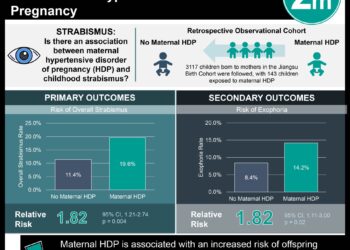HELLP syndrome is variant of preeclampsia [Classics Series]
This study summary is an excerpt from the book 2 Minute Medicine’s The Classics in Medicine: Summaries of the Landmark Trials
1. The syndrome of hemolysis, elevated liver enzymes and low platelets (HELLP) was defined as a destructive, consumptive coagulopathy on the spectrum of preeclampsia.
Original Date of Publication: January 1982
Study Rundown: The syndrome of HELLP is a high-risk obstetrical condition that is characterized by thrombocytopenia, hemolysis (microangiopathic hemolytic anemia), and elevated liver enzymes. HELLP syndrome is thought to be first described in a small case series in the 1950s, but remained poorly understood for decades thereafter. Previously, small case series identified a number of laboratory abnormalities in pregnant women with elevated blood pressures, including thrombocytopenia, hemolysis, and transaminitis. However, these investigations attributed transaminitis to nonobstetric etiologies, such as hepatitis. Then, a small case series described 5 severely ill pregnant patients with transaminitis and biopsy-proven liver damage in the absence of severely elevated blood pressures. This report highlight our lack of understanding of whether newly elevated blood pressures in pregnancy was a highly reproducible or requisite feature of new liver dysfunction in pregnancy. The present study was the first to define a unifying diagnosis of HELLP syndrome as elevated blood pressures, thrombocytopenia, hemolysis, and liver dysfunction in pregnancy.
This landmark case series was the first to characterize the classical features of HELLP syndrome, as well as the remarkably high maternal morbidity, and characterized the disease as a consumptive process on the spectrum of preeclampsia. Investigators demonstrated that both normotensive and hypertensive women can experience HELLP, making serial laboratory testing in preeclamptic patients, and high indices of suspicion advisable. Findings contributed to improved early recognition, timely diagnosis and treatment of this highly morbid condition in pregnancy. Strengths included comprehensive review of clinical presentation, disease course, and maternal and neonatal outcomes as well as thorough assessment and discussion of findings, existing literature and possible pathophysiologic mechanisms of disease. Limitations included a descriptive study and small sample size of 29 patients at a single institution.
Click to read the study in AJOG
In-Depth [randomized controlled trial]: All pregnant women diagnosed with HELLP syndrome at a single institution in Arizona (n = 29) were followed over a 30 month period. Outcomes included obstetric and neonatal morbidity and mortality including eclampsia, severe-range blood pressures (blood pressures ≥160/110), proteinuria (2+ or greater on urine dip), thrombocytopenia (platelets < 100,000), and microangiopathic hemolytic anemia (MAHA). Once the diagnosis of HELLP syndrome was made, women were delivered expediently via induction of labor in the setting of a favorable cervix or cesarean section in the instance of an unfavorable cervix.
Nausea, right upper quadrant pain, transaminitis, proteinuria and thrombocytopenia were present in 100% of women with HELLP syndrome and 97% had MAHA on peripheral blood smear. Severe-range blood pressures occurred in 30% of primigravid and 78% of multiparous women with HELLP, while eclampsia occurred in 15% of primigravid and 11% of multiparous women. Numerous women developed HELLP syndrome within 2 weeks of hospitalization for preeclampsia. Adverse maternal and fetal outcomes included 1 maternal death (3%) and 3 neonatal deaths (9%). Twin gestation (11%), chronic hypertension (10%), and diabetes mellitus (7%) pre-existent to pregnancy were prevalent in women diagnosed with HELLP.
Weinstein L. Syndrome of hemolysis, elevated liver enzymes, and low platelet count: a severe consequence of hypertension in pregnancy. American journal of obstetrics and gynecology. 1982;142(2):159-67.
©2022 2 Minute Medicine, Inc. All rights reserved. No works may be reproduced without expressed written consent from 2 Minute Medicine, Inc. Inquire about licensing here. No article should be construed as medical advice and is not intended as such by the authors or by 2 Minute Medicine, Inc





![The ABCD2 score: Risk of stroke after Transient Ischemic Attack (TIA) [Classics Series]](https://www.2minutemedicine.com/wp-content/uploads/2013/05/web-cover-classics-with-logo-medicine-BW-small-jpg-75x75.jpg)
